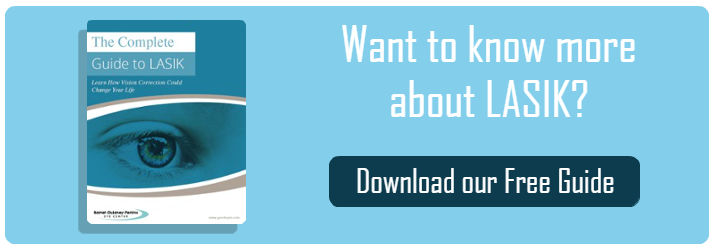 You’re interested in having LASIK surgery, but you’re expecting a baby (or hoping to be pregnant soon). Can you have the surgery safely during pregnancy or while you are breastfeeding? What do the professionals recommend?
You’re interested in having LASIK surgery, but you’re expecting a baby (or hoping to be pregnant soon). Can you have the surgery safely during pregnancy or while you are breastfeeding? What do the professionals recommend?
Your body undergoes tremendous hormonal changes during pregnancy. Let’s look at how those changes affect your eyes.
Hormones, tears, water retention and your eyes
When you become pregnant, the hormones HCG (human chorionic gonadotropin), progesterone, estrogen, oxytocin, prolactin and relaxin all take on important roles. HCG is the dominant one, sending signals to crucial parts of your body to nurture and protect the developing fetus.
Progesterone affects the uterus and the immune system; estrogen is a primary factor in the development of the baby’s organs; oxytocin, prolactin and relaxin prepare different parts of your body for labor, delivery and breastfeeding.
But hormones have side effects, too, and that’s where pregnancy symptoms such as nausea, high or low blood pressure, heartburn, water retention and hair and skin changes are rooted.
In your eyes, these hormones can cause decreased tear production, which in turn can cause dry eyes and irritation, especially if you wear contact lenses. At the same time, the hormones that cause you to retain water in your joints can increase fluid buildup in your eyes, which can change the curvature of the cornea and affect your vision. Blurred vision is common in pregnancy, though more serious vision problems can be a symptom of gestational diabetes or high blood pressure.
Should those hormones affect my desire for LASIK surgery?
Let’s say you’re nearsighted or farsighted; you have astigmatism or thin corneas. Perhaps you even took the step of having a first visit with an eye surgeon before you knew you were pregnant, and you were told you’re a good candidate for LASIK. You know about the possible added discomfort or vision changes expected during pregnancy, making you want to consider the surgery even more. And, you think, there’s the very pleasant possibility of not having to deal with glasses or contacts after the baby arrives.
This is all understandable. But there are good reasons to wait.
The curvature of your eye is a critical component in your vision. After light travels through the cornea (the transparent, round tissue that is on the outside of your eye), it (travels back through the pupil toward the retina.
- If the curvature of the cornea is correct, the light hits the retina perfectly.
- If the light travels or focuses on to a spot before the retina, you are said to be nearsighted
- If it focuses on a spot past the retina, you are said to be farsighted.
Your prescription for eyeglasses or contact lenses is based largely on how light interacts with your corneas.
LASIK surgery changes the shape of your corneas, which changes your prescription. The eye surgeon takes measurements that tell the laser-guided instrument where to remove corneal tissue to improve your vision.
If you’re nearsighted, the laser flattens the cornea; if you’re farsighted, it creates a steeper curve. Because of this, you want to have the measurements taken and procedure done when your eyes are stable – which is not the case during pregnancy.
This is also the reason that eye surgeons don’t do LASIK on young adults – their eyes simply haven’t yet stopped changing. If you were to have LASIK surgery during pregnancy and then your eyes were to revert to their pre-pregnancy state, your LASIK results would likely be imperfect.
Is there anything about LASIK that is dangerous to a fetus or a nursing baby?
The laser procedure itself does not affect anything but your eye. However, LASIK patients are prescribed eye drops and medications that can enter the bloodstream. The eye drops include those that dilate your eyes before surgery and antibiotic and/or steroid drops afterward. Not all of these drops have been determined to be safe for pregnant women. In addition, patients are often prescribed Valium or a similar medication to help them relax during the procedure and immediately afterward.
If you have had a baby and are currently nursing, be aware that there are still hormones in your body that affect your eyes and eyesight. And since the medications listed above can enter your breast milk, ophthalmologists routinely recommend waiting.
How long should I wait after pregnancy before I have LASIK?
Recommendations differ, but most eye surgeons (including Barnet Dulaney Perkins Eye Center) will tell you to wait at least until after you have had one menstrual period, either after the baby is born (if you are not breastfeeding) or after you have stopped nursing. This will give your eyes time to revert to normal, allowing your surgeons to take proper measurements and ensuring the best possible long-term success for a LASIK procedure.
If you have more questions about LASIK or eye care during pregnancy, contact us today or schedule a consultation by calling (866) 742-6581.


